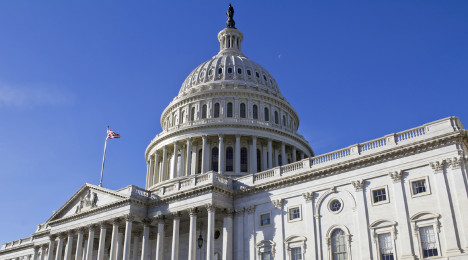2nd Bill Focused on Auto Financing Back in US House

By subscribing, you agree to receive communications from Auto Remarketing and our partners in accordance with our Privacy Policy. We may share your information with select partners and sponsors who may contact you about their products and services. You may unsubscribe at any time.
WASHINGTON, D.C. –
The National Automobile Dealers Association applauded the continued bipartisan efforts in Congress to rescind what it considers “flawed” guidance from the Consumer Financial Protection Bureau that would “harm” consumers by limiting their ability to obtain discounted auto financing.
This week, Rep. Frank Guinta, a New Hampshire Republican, and Rep. Ed Perlmutter, a Colorado Democrat, introduced H.R. 1737, the Reforming CFPB Indirect Auto Financing Guidance Act of 2015. The legislation would repeal a CFPB bulletin from 2013 that was designed to pressure lending institutions into eliminating the availability of auto financing discounts.
NADA insisted these discounts save consumers millions of dollars every year.
“Consumers have the right to obtain auto financing at discounted rates, and those rights should be protected, not threatened,” NADA president Peter Welch said. “There is bipartisan support in Congress to require the CFPB to consider how harmful its guidance could be to consumers, and we applaud Reps. Guinta and Perlmutter for their leadership on this issue.”
Welch pointed out that the CFPB’s “lack of transparency and accountability” has prompted 91 members of Congress to request additional information from the agency on how it arrived at the conclusions it used to justify its original March 2013 guidance, but none of these requests have been completely fulfilled, and many have gone unanswered altogether.
The Reforming CFPB Indirect Auto Financing Guidance Act was initially introduced at the end of the 113th Congress and garnered the support of 149 House Republicans and Democrats.
Subscribe to Auto Remarketing to stay informed and stay ahead.
By subscribing, you agree to receive communications from Auto Remarketing and our partners in accordance with our Privacy Policy. We may share your information with select partners and sponsors who may contact you about their products and services. You may unsubscribe at any time.
In addition to rescinding the CFPB’s flawed guidance, H.R. 1737 would require the bureau to follow a transparent process — including providing for a public comment period, consulting with the agencies that share jurisdiction over the indirect auto financing market, and disclosing its testing methodologies — prior to issuing any future guidance related to indirect auto credit.
Along with Guinta and Perlmutter, co-sponsors of H.R. 1737 include:
• Rep. Marlin Stutzman, Indiana Republican
• Rep. David Scott, Georgia Democrat
• Rep. Steve Stivers, Ohio Republican
• Rep. Brad Sherman, California Democrat
• Rep. Roger Williams, Texas Republican
• Rep. Daniel Kildee, Michigan Democrat
• Rep. Joyce Beatty, Ohio Democrat
The CFPB has acknowledged that it did not analyze or estimate the economic impact its guidance would have on consumers. Additionally, while the bureau’s own report showed that its model for measuring fair credit risk is flawed, it has not responded to a major peer-review study by Charles River Associates that found several significant flaws in the Bureau's methodology, which have led to “inaccurate, incomplete and unreliable” conclusions about pricing disparities in the auto finance market, according to NADA.
NADA chairman Bill Fox spent part of his speech at the NADA/J.D. Power Automotive Forum on March 31 going through what he believes to be the many positives of the retail automotive business, including its employment of thousands of people and its backing by “innovation and value.”
But not everyone sees the dealership business as he and many others do; the Consumer Financial Protection Bureau “looks at our business with a different eye,” Fox said.
“Instead of seeing a competitive business with razor-thin margins, they allege bad behavior without any evidence,” Fox said. “There are millions of consumers shopping for cars right now, online and in our stores. Once a customer buys a car, they need help finding the most affordable auto financing.
“And that’s every customer’s right. Customers can shop on their own, or they can do what 80 percent of all buyers do: they can go to their local auto dealership, and with a push of a button, a dealer can instantly send their credit application to 20 or 30 lenders to get an even better rate,” he continued.
“That fierce competition between lenders is driven by the dealers, because they know that they can get a lower interest rate for customers. Dealers add an extra dimension of competition in this market because they can discount the rate that they are getting from the lenders,” Fox said. “What I see is a good deal for everyone; consumers are getting better loan rates more quickly; banks are getting an instant clientele and dealers are being compensated for creating the most efficient credit market there is in our industry.”
However, Fox alleges the CFPB aims to get rid of that competition and eliminate rate discounting.
The price fixing and flat fee system that the CFPB has proposed “would destroy competition and lead to higher interest rates for everyone,” he said.
“The good news is that the CFPB’s solution isn’t the only one on the table. Dealers have produced a compliance program that ensures compliance with U.S. Department of Justice standards,” he said. “The program ensures the customer’s right to get an interest rate discount fairly.”
Staff writer Joe Overby contributed to this report.


